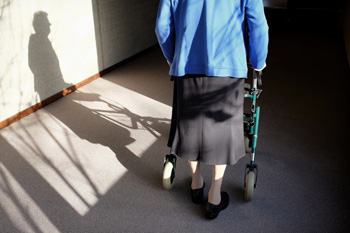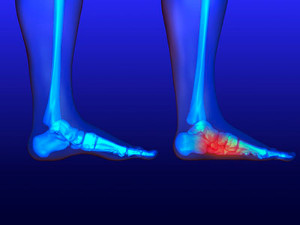
Drexel Hill (484) 521-0233
West Chester (610) 436-5883

Drexel Hill (484) 521-0233
West Chester (610) 436-5883
Wounds can occur on any part of the body but they are especially common on the feet and lower legs, especially in people who have diabetes. Often, a combination of diabetes, poor circulation, and peripheral neuropathy can lead to slow-healing wounds forming on the lower limbs and going unnoticed for a period of time due to a lack of sensation. This can increase the chances of the wound becoming infected. Symptoms of infection include increased pain, redness, warmth, and swelling around the wound, yellow or green discharge or an unpleasant odor from the wound, fever or chills, aches, pain, nausea and vomiting. If you have wounds showing signs of infection, it is strongly recommended that you seek treatment as soon as possible. If you have diabetes and are prone to foot wounds, a podiatrist can help you maintain the health of your feet.
Wound care is an important part in dealing with diabetes. If you have diabetes and a foot wound or would like more information about wound care for diabetics, consult with the podiatrists from Dr. Siegerman & Associates. Our doctors will assess your condition and provide you with quality foot and ankle treatment.
What Is Wound Care?
Wound care is the practice of taking proper care of a wound. This can range from the smallest to the largest of wounds. While everyone can benefit from proper wound care, it is much more important for diabetics. Diabetics often suffer from poor blood circulation which causes wounds to heal much slower than they would in a non-diabetic.
What Is the Importance of Wound Care?
While it may not seem apparent with small ulcers on the foot, for diabetics, any size ulcer can become infected. Diabetics often also suffer from neuropathy, or nerve loss. This means they might not even feel when they have an ulcer on their foot. If the wound becomes severely infected, amputation may be necessary. Therefore, it is of the upmost importance to properly care for any and all foot wounds.
How to Care for Wounds
The best way to care for foot wounds is to prevent them. For diabetics, this means daily inspections of the feet for any signs of abnormalities or ulcers. It is also recommended to see a podiatrist several times a year for a foot inspection. If you do have an ulcer, run the wound under water to clear dirt from the wound; then apply antibiotic ointment to the wound and cover with a bandage. Bandages should be changed daily and keeping pressure off the wound is smart. It is advised to see a podiatrist, who can keep an eye on it.
If you have any questions, please feel free to contact one of our offices located in Drexel Hill and West Chester, PA . We offer the newest diagnostic and treatment technologies for all your foot care needs.
 Sever’s disease occurs when the bones in the calves grow faster than the Achilles tendon, which connects the heel bone to the calf muscle. When this happens, the tendon begins to tighten, and the heel becomes swollen and sore. Sever’s disease often affects children between the ages of 9 and 13 who are participants in running and jumping sports such as soccer, gymnastics, baseball, basketball, and football. There is rarely swelling as a result, and most often, the heel pain is worse when running with shoes that have limited support. The pain usually goes away with rest and does not have an impact with low impact sports such as cycling and swimming. If your child complains of heel pain, you should take them to see a podiatrist for a proper examination. Upon examination, a podiatrist will be able to provide a proper diagnosis and treatment method.
Sever’s disease occurs when the bones in the calves grow faster than the Achilles tendon, which connects the heel bone to the calf muscle. When this happens, the tendon begins to tighten, and the heel becomes swollen and sore. Sever’s disease often affects children between the ages of 9 and 13 who are participants in running and jumping sports such as soccer, gymnastics, baseball, basketball, and football. There is rarely swelling as a result, and most often, the heel pain is worse when running with shoes that have limited support. The pain usually goes away with rest and does not have an impact with low impact sports such as cycling and swimming. If your child complains of heel pain, you should take them to see a podiatrist for a proper examination. Upon examination, a podiatrist will be able to provide a proper diagnosis and treatment method.
Sever's disease often occurs in children and teens. If your child is experiencing foot or ankle pain, see the podiatrists from Dr. Siegerman & Associates. Our doctors can treat your child’s foot and ankle needs.
Sever’s Disease
Sever’s disease is also known as calcaneal apophysitis, which is a medical condition that causes heel pain I none or both feet. The disease is known to affect children between the ages of 8 and 14.
Sever’s disease occurs when part of the child’s heel known as the growth plate (calcaneal epiphysis) is attached to the Achilles tendon. This area can suffer injury when the muscles and tendons of the growing foot do not keep pace with bone growth. Therefore, the constant pain which one experiences at the back of the heel will make the child unable to put any weight on the heel. The child is then forced to walk on their toes.
Symptoms
Acute pain – Pain associated with Sever’s disease is usually felt in the heel when the child engages in physical activity such as walking, jumping and or running.
Highly active – Children who are very active are among the most susceptible in experiencing Sever’s disease, because of the stress and tension placed on their feet.
If you have any questions, please feel free to contact one of our offices located in Drexel Hill and West Chester, PA . We offer the newest diagnostic and treatment technologies for all your foot and ankle injuries.
 As the feet get older, they can become worn down from years of supporting the body. The skin becomes less elastic, which can lead to issues such as blisters and cracked heels. Because of the complexity of issues that can arise, wearing the right footwear is one of the most important factors in caring for your feet. Shoes should have a proper grip and gently hug the feet. Keeping the feet clean, warm, and dry is important as well in order to prevent an infection. The toenails should be cut short and straight across in order to prevent ingrown toenails. Any issues with the feet should be checked by a podiatrist in order to prevent them from getting worse. This includes any sores or other abnormalities. A podiatrist will also be able to provide other recommendations on how to care for your feet.
As the feet get older, they can become worn down from years of supporting the body. The skin becomes less elastic, which can lead to issues such as blisters and cracked heels. Because of the complexity of issues that can arise, wearing the right footwear is one of the most important factors in caring for your feet. Shoes should have a proper grip and gently hug the feet. Keeping the feet clean, warm, and dry is important as well in order to prevent an infection. The toenails should be cut short and straight across in order to prevent ingrown toenails. Any issues with the feet should be checked by a podiatrist in order to prevent them from getting worse. This includes any sores or other abnormalities. A podiatrist will also be able to provide other recommendations on how to care for your feet.
Proper foot care is something many older adults forget to consider. If you have any concerns about your feet and ankles, contact the podiatrists from Dr. Siegerman & Associates. Our doctors can provide the care you need to keep you pain-free and on your feet.
The Elderly and Their Feet
As we age we start to notice many changes in our body, but the elder population may not notice them right away. Medical conditions may prevent the elderly to take notice of their foot health right away. Poor vision is a lead contributor to not taking action for the elderly.
Common Conditions
Susceptible Infections
Diabetes and poor circulation can cause general loss of sensitivity over the years, turning a simple cut into a serious issue.
If you have any questions please feel free to contact one of our offices located in Drexel Hill and West Chester, PA . We offer the newest diagnostic and treatment technologies for all your foot and ankle needs.
 Fallen arches or acquired flat feet occur when the arches of the feet collapse over time due to a weakening of the tendon that supports the arch. One of the main functions of the arches is to flex and absorb shock. When the arches are flat, stress is transferred up into the legs, hips, and lower back, causing pain in both the feet and these areas higher up in the body. Fallen arches can also cause the ankle and leg bones to rotate slightly, which can make ankle and ACL injuries more likely. If you have fallen arches, it is recommended that you seek the care of a podiatrist, who can help prevent or minimize the pain and discomfort caused by this condition.
Fallen arches or acquired flat feet occur when the arches of the feet collapse over time due to a weakening of the tendon that supports the arch. One of the main functions of the arches is to flex and absorb shock. When the arches are flat, stress is transferred up into the legs, hips, and lower back, causing pain in both the feet and these areas higher up in the body. Fallen arches can also cause the ankle and leg bones to rotate slightly, which can make ankle and ACL injuries more likely. If you have fallen arches, it is recommended that you seek the care of a podiatrist, who can help prevent or minimize the pain and discomfort caused by this condition.
Flatfoot is a condition many people suffer from. If you have flat feet, contact the podiatrists from Dr. Siegerman & Associates. Our doctors will treat your foot and ankle needs.
What Are Flat Feet?
Flatfoot is a condition in which the arch of the foot is depressed and the sole of the foot is almost completely in contact with the ground. About 20-30% of the population generally has flat feet because their arches never formed during growth.
Conditions & Problems:
Having flat feet makes it difficult to run or walk because of the stress placed on the ankles.
Alignment – The general alignment of your legs can be disrupted, because the ankles move inward which can cause major discomfort.
Knees – If you have complications with your knees, flat feet can be a contributor to arthritis in that area.
Symptoms
Treatment
If you are experiencing pain and stress on the foot you may weaken the posterior tibial tendon, which runs around the inside of the ankle.
If you have any questions please feel free to contact one of our offices located in Drexel Hill and West Chester, PA . We offer the newest diagnostic and treatment technologies for all your foot and ankle needs.
Request a free copy of
Laser Away Foot Pain!
today.
